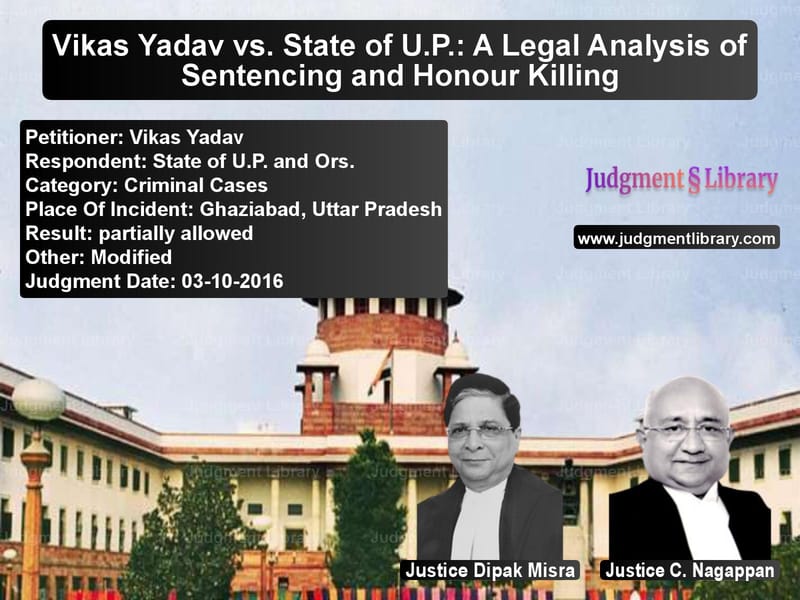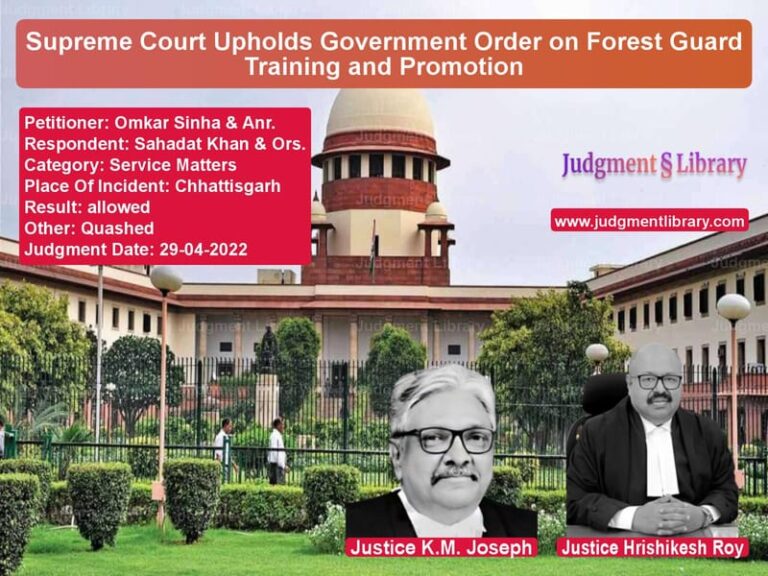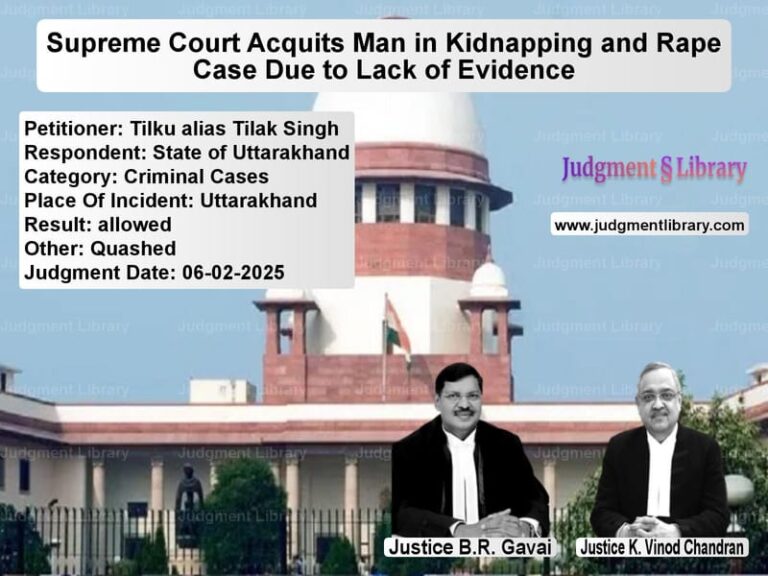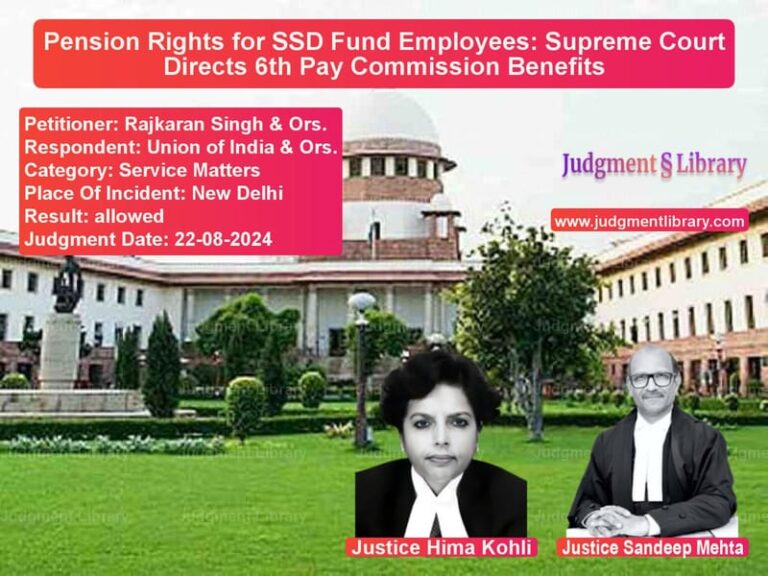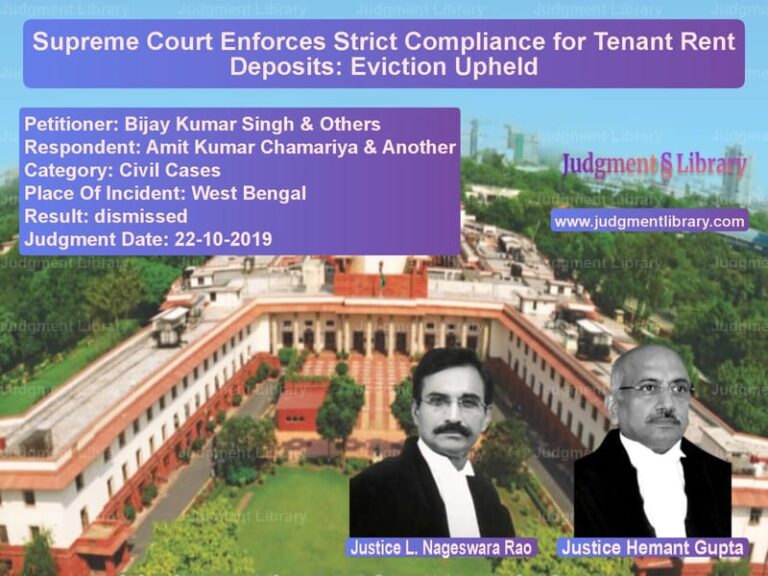Vikas Yadav vs. State of U.P.: A Legal Analysis of Sentencing and Honour Killing
The case of Vikas Yadav vs. State of U.P. is a landmark judgment in Indian criminal law, focusing on sentencing principles, honour killing, and judicial discretion in awarding fixed-term sentences. The case gained prominence due to its social and legal implications, particularly regarding honour killings and the concept of fixed-term life sentences.
The Supreme Court was tasked with reviewing the quantum of punishment for the appellants, who were convicted under Sections 302, 364, and 201 read with Section 34 of the Indian Penal Code (IPC). The trial court sentenced them to life imprisonment, but the High Court modified the sentence, imposing a fixed-term imprisonment of 25 years for the offence under Section 302 IPC, along with a consecutive five-year sentence under Section 201 IPC.
Background of the Case
The case revolves around the brutal murder of Nitish Katara, allegedly in an act of honour killing. Nitish was in a relationship with Bharti Yadav, the sister of the accused, Vikas Yadav. The family of Bharti Yadav strongly opposed this relationship due to caste differences and their social standing. On the night of February 16, 2002, Nitish Katara was abducted from a wedding and later murdered. His body was found burnt beyond recognition, and forensic evidence confirmed the identity of the deceased.
Legal Proceedings and Conviction
The trial court convicted the accused under Sections 302 (murder), 364 (kidnapping with intent to murder), and 201 (causing disappearance of evidence) read with Section 34 IPC. The trial judge sentenced them to life imprisonment under Section 302 IPC, along with concurrent sentences for other offences. The prosecution appealed to the High Court for enhancement of the sentence to the death penalty.
The High Court, while declining to impose the death penalty, enhanced the life imprisonment term to a fixed term of 25 years without remission. Additionally, the court imposed a five-year sentence under Section 201 IPC, to run consecutively.
Arguments Presented by the Appellants
The appellants, represented by senior counsels, raised several arguments against the High Court’s judgment:
- Judicial Overreach in Sentencing: The defence contended that the judiciary could not introduce a third category of punishment beyond life imprisonment or death.
- Violation of Legislative Intent: It was argued that the High Court’s decision to impose a fixed-term sentence contradicted Sections 302 and 386 of the CrPC, which do not provide for such an alternative.
- Impact on Remission Powers: The appellants argued that a fixed-term sentence curtailed the executive’s power to grant remission after 14 years, as provided under Section 433-A CrPC.
- Disproportionate Punishment: The defence claimed that the crime did not warrant such a harsh sentence, especially since the trial court had not awarded the death penalty.
Arguments by the Prosecution
The prosecution, led by the State of NCT Delhi, defended the High Court’s ruling, citing the Supreme Court’s precedent in V. Sriharan alias Murugan. The key arguments included:
- Judicial Authority in Sentencing: The prosecution emphasized that courts had the discretion to impose fixed-term sentences in exceptional cases, as upheld in the Swamy Shraddananda case.
- Nature of the Crime: The brutal and premeditated nature of the murder, coupled with the attempt to destroy evidence, warranted a harsher punishment.
- Deterrence for Honour Killings: Given the increasing cases of honour killings, the prosecution argued for stringent penalties to deter such crimes.
Judgment and Legal Reasoning
The Supreme Court examined the arguments and legal precedents in detail. It reaffirmed that the High Court was within its rights to impose a fixed-term sentence under the expanded sentencing framework established in V. Sriharan. The court ruled:
- The sentence of life imprisonment means imprisonment for the entire natural life of the convict, unless commuted or remitted by the government.
- In cases where the death penalty is not awarded, courts can impose a fixed-term life sentence without remission.
- The conviction under Section 201 IPC should run concurrently with other sentences, modifying the High Court’s directive.
Honour Killings and Social Implications
The judgment highlighted the grave issue of honour killings in India. The court emphasized that crimes committed under the pretext of preserving family honour were barbaric and unconstitutional. The court observed:
“There is nothing honourable in honour killings. These are acts of violence rooted in feudal and casteist mindsets that must be eradicated.”
The judgment cited previous cases such as Lata Singh vs. State of U.P. and Bhagwan Dass vs. State (NCT of Delhi), which condemned honour killings and called for stringent punishments.
Final Verdict
The Supreme Court upheld the High Court’s fixed-term sentence but modified the directive that the sentence under Section 201 IPC should run concurrently. The ruling reinforced the judiciary’s role in ensuring justice while respecting legislative frameworks.
This case serves as a precedent for sentencing in honour killing cases and affirms the judiciary’s authority in imposing fixed-term life sentences where warranted.
Don’t miss out on the full details! Download the complete judgment in PDF format below and gain valuable insights instantly!
Download Judgment: Vikas Yadav vs State of U.P. and Or Supreme Court of India Judgment Dated 03-10-2016.pdf
Direct Downlaod Judgment: Direct downlaod this Judgment
See all petitions in Murder Cases
See all petitions in Bail and Anticipatory Bail
See all petitions in Juvenile Justice
See all petitions in Fraud and Forgery
See all petitions in Attempt to Murder Cases
See all petitions in Judgment by Dipak Misra
See all petitions in Judgment by C. Nagappan
See all petitions in partially allowed
See all petitions in Modified
See all petitions in supreme court of India judgments October 2016
See all petitions in 2016 judgments
See all posts in Criminal Cases Category
See all allowed petitions in Criminal Cases Category
See all Dismissed petitions in Criminal Cases Category
See all partially allowed petitions in Criminal Cases Category

